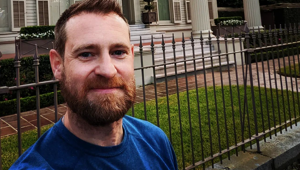
Few names tower over the American literary scene like those of Tennessee Williams and Truman Capote.
Both left an indelible impression on the world: Capote through his novels Breakfast at Tiffany’s and In Cold Blood, and Williams through his stage dramas, including Cat on a Hot Tin Roof and A Streetcar Named Desire. The two writers–both gay men–challenged notions of American life, sexuality and gender, and both struggled with substance abuse prior to their untimely deaths. In realty, the two maintained a close friendship throughout their lives, occasionally vacationing and writing together.
Now director Lisa Immordino Vreeland wants to take the world inside the private lives and friendships of these two icons. Her latest documentary, Truman & Tennessee: An Intimate Conversation utilizes archive footage, excerpts of the written works of both men, and their private diaries and correspondence to contextualize and illuminate the friendship between the pair. Actors Zachary Quinto and Jim Parsons also lend their talents to the film, narrating the words of Williams & Capote, respectively. In keeping with her earlier films, Love Cecil, Peggy Guggenheim: Art Addict and Diana Vreeland: The Eye has to Travel, Vreeland chronicles the mind of creative genius, and the private demons that influenced their work.
Truman & Tennessee is currently playing the festival circuit and seeking distribution. We caught up with Vreeland just ahead of the Newfest engagement to chat about the movie, her fascination with Williams & Capote, and what made a straight woman want to study two gay men.
How about we take this to the next level?
Our newsletter is like a refreshing cocktail (or mocktail) of LGBTQ+ entertainment and pop culture, served up with a side of eye-candy.
When and why did you become so enamored of Tennessee Williams & Truman Capote? What was it about his fame ambitions that you found so compelling?
Well, I had initially wanted to do something on Truman. I had decided to focus on an American writer, and I kept thinking about Truman’s life. If you go on YouTube or watch anything about him, you’ll quickly see that the life of Truman we see is a destroyed life—a mess, a drunk. And I don’t like the fact that society is getting that impression. He was an amazing writer.

Yes he was.
So that was my initial idea. I wanted his words to speak, to give him gravitas. I wanted to glorify him as a writer. His fall was such a deep fall, and so well documented, that it is quite unfair. That’s not what interested me.
What happened was that another doc came out on Truman Capote at [the Toronto Film Festival, The Capote Tapes] before mine had. I knew my film would be different anyway, but I was sure how I was going to make it. My producer, Mark Lee, said “Why don’t you throw Tennessee into the mix?” The moment I started to look at Tennessee’s life, it was clear there were so many similarities. I knew I could the narrative could be very free; never did I want to do a biopic. Unfortunately, I feel that documentaries suffer from this need to be a biopic.
I know what you’re saying.
It doesn’t have to be that way. I knew there would be actors who would do voiceover. I knew, visually, I wanted there to be layers of footage on top of each other to convey the sensation of the words. As I always do in my films, I love research and discovering new archival footage to add. I like that it makes it feel authentic to the period. We obviously had archival interviews; the footage of David Frost was just amazing.
Yes.
I already had Frost with Truman. Then I found Frost with Tennessee, so it was really clear that I could construct it in a very different way. Working with Bernardine—this is our third film together—it was so much fun. We had all their words from the archives—letters, books—all this material to create a story. We based it off the archival interviews and moments in history we knew they were together where we knew we could use as a launchpad. We didn’t have to follow any chronological order, which is fantastic. That seems to bother some people, based on some of the reviews that think it should have been a biopic.

That’s ridiculous. It’s clearly not your point to make a biopic. It’s clear to me your thesis is more about the incredible parallels between these friends, these two men. Correct me if I’m wrong…
You’re right. And it’s the inner workings of these—how often do we get an opportunity to talk about the inner life of two literary voices? And we get to do it with intimacy: the question of what is the creative process is something that really interests me. I’m curious about it. I want to understand it.
You draw so many parallels between the men: their sexuality, their Southern upbringing, their vices, their subjects, and the way their private lives translate into their text. They also love fame. Do you see them as narcissists?
I think I can quickly say Capote was more of a narcissist than Tennessee. I say that just from Capote’s life. From the time he was young he was creating this image of himself, and he yearned to be in the spotlight. You don’t really get that in the young Tennessee. Tennessee did things much later in life and struggled. The fact that he didn’t have sex until he was 28—and boy, the fact that he made up for it, just cruising nonstop…
[Laughter]
There’s a great book called Notebook, and it’s just his journals and notebooks. It’s full of every cruising episode he did.
Must be a long book.
He was insatiable. Capote, from the start, there was a veneer. You never knew if he was telling the truth. Tennessee, really, was very shy. When he was in the spotlight, he was in the spotlight. We forget that at the height of his addiction and alcoholism, he was still writing. Capote—I don’t think he wrote. The whole legend of Answered Prayers [Capote’s lost final novel]–I don’t think he was writing.
Well let’s talk about that a moment. There’s another parallel there in that they both struggled later in their careers. Tennessee was still writing and having shows staged into his later year, but neither of them hit the same high they reach before with In Cold Blood or A Streetcar Named Desire—early works. Do you think, as Truman says in the film, they got too comfortable?
I think in Truman’s case, writing In Cold Blood took so much out of him, it nearly destroyed him. I think that his creative genius had almost expired. His addiction was so huge. I think he was incapable of working, but I don’t think he ever saw himself differently. In Tennessee’s case, he was creating, but he wasn’t creating to that level. He was always creating characters in his head. I really feel he continued to create much more than Truman.

Now, regarding Answered Prayers, I know some say that it absolutely existed and Truman destroyed it. I’m not sure.
I don’t know. I worked very closely with the Capote estate which is run by Alan Schwarz, Truman’s lawyer. He’s a fascinating figure, who was also Tennessee’s lawyer at one point. I asked him if Answered Prayers ever existed, and he doesn’t think so.
Wow.
The thing is, going through these works, I didn’t want it to be a shopping list. But the things Truman wrote about were things he found in the archives of the New York Public Library. I found that fascinating, to share that part of the story. We didn’t want to tick boxes. We wanted to highlight them equally. In the end, it’s talking about what was inside of these guys. They were ultimately not happy human beings, but they were brilliant. I was attracted to all of that. And we, as a team, had such joy making the film.
Katherine Hepburn once advised a friend against writing a biography of Tennessee. Did you find yourself depressed by what you found?
It’s a good question. It’s funny, sometimes it does. In the case of Peggy Guggenheim, the subject of my film Art Addict, she was very dark. She couldn’t show love. That got me bummed. It’s just a sad story. She was never showed love, she had a horrendous relationship with her daughter who committed suicide. That got me blue. But I didn’t get the mean blues [with Tennessee & Truman]. These are topics we can talk about now—the mean blues, depression, addiction. It didn’t get me because of the words. I have to say Tennessee hooked me immediately. And all my research with Truman was done a year before. And I just fell in love with Tennessee’s words immediately. I read his journals—and there are lots of entries of the “mean blues”–but his words are just magical. They are truth. They are talking about human emotion in a way people never think about. I like that. It goes back to authenticity: I believe in telling the story a certain honest way.
So no, I didn’t let it get me down.

That’s good.
If I had, I think it would have been with Truman. There was a much darker edge there that I just didn’t like. He had a mean streak.
I know what you mean. It helps too that you have two great actors, Zachary Quinto and Jim Parsons reading their words. How did you go about directing Zachary and Jim? Did you push them to imitate their voices?
It’s a good question. I think what you have to do—we always have discussions before. Then, I was at the recording studio with them, and I’m super easy to work with. It’s just a give and take—a conversation we’re having. I always let talent go a bit on their own first. Then, like with Jim, I sat him down and said “Let’s give Truman a bit more gravitas.” We’re thinking of his words, not his coquettes.
Interesting.
Then, Zach, said [Tennessee] always drops a letter or a vowel. He’s a huge fan of Tennessee and has acted his work on Broadway. So we just worked together and did three or four takes. Then usually at the end of the session, I have them go back to the beginning lines and have them repeat them, because then they’re all warmed up.
You seem to have a fascination with “high society” people: Diana Vreeland, Cecil Beaton, Peggy Guggenheim, Truman, Tennessee. What’s that about?
You know what it is? First, it’s the creative process in all these people. The second is that there is often reinvention in these characters. That’s especially true in the case of Vreeland, Guggenheim, Beaton and Capote. Then, every one of them were open about their feelings. There’s also something very visual about them, so I love to tell their stories. Perhaps in this film I had the least amount of visual elements. But we created so many of our own. All these characters give me a reason to use different visual materials, and they are rich visually in different ways.
Truman & Tennessee: An Intimate Conversation is currently seeking distribution. Fans can follow updates on Instagram with the tag #trumanandtennessee.


















